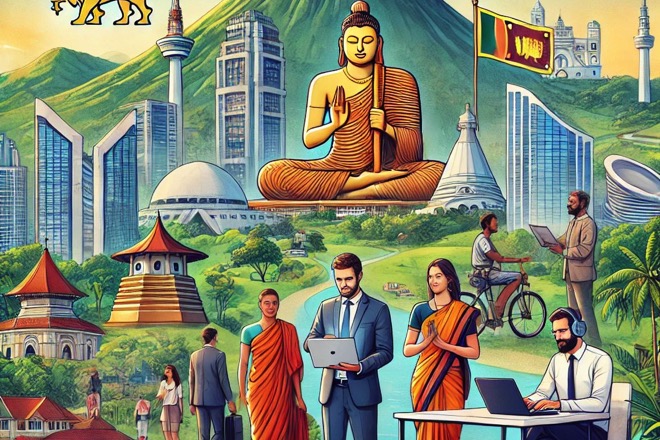By Jithendra Antonio
In a world increasingly fragmented by geopolitical conflict, Sri Lanka has a remarkable opportunity to establish itself as a sanctuary for global talent and displaced professionals. Spanning over 65,000 square kilometers with a GDP of $74 billion at present, this island nation can strategically leverage its location and legal framework to attract high-net-worth individuals and skilled expatriates in search of refuge. With an adaptable legal environment and tailored incentives, Sri Lanka is positioned to be not only a destination for those seeking stability but also a thriving center for international business.
Sri Lanka’s rich demographic diversity supports this vision, with a population comprised of 74.9% Sinhalese, 11.2% Sri Lankan Tamils, 9.2% Sri Lankan Moors, 4.2% Indian Tamils, and 0.5% others, including Burghers, Malays, and Veddas. Religiously, it offers an inclusive tapestry where 70.2% of the population follows Buddhism, 12.6% Hinduism, 9.7% Islam, 7.4% Christianity, and 0.1% other. Such an array of backgrounds fosters a culturally vibrant environment, making Sri Lanka a welcoming destination for global expatriates.
A Legal and Economic Haven for International Business
Sri Lanka possesses distinct advantages in its corporate and commercial law framework, making it a preferred choice over some Middle Eastern nations for international businesses. Unlike regions where legal systems are heavily influenced by local customs and can be complex to navigate, Sri Lanka’s flexible legal system draws from Roman-Dutch law and English common law, making it easier for foreign enterprises to operate. Under the Companies Act No. 7 of 2007, limited liability companies can be established with minimal bureaucratic obstacles, allowing foreign investors to set up operations swiftly. Sri Lanka’s Board of Investment (BOI) offers tax incentives, such as a reduced corporate tax rate of 14% in certain sectors, which is notably competitive compared to the higher rates in the Middle East. The country’s adherence to party autonomy also allows businesses to choose their governing laws and dispute resolution mechanisms, including arbitration, offering a flexible and business-friendly environment.
With a strategic location along major maritime routes, a skilled workforce, and ongoing infrastructure development, Sri Lanka is emerging as a competitive hub for businesses aiming to expand in South Asia.
An Emerging Tech Hub for Digital Nomads and Entrepreneurs
Sri Lanka’s IT infrastructure, combined with modern urban environments, nature as well as corporate policies, positions it as an ideal destination for digital nomads and tech-savvy entrepreneurs. The government could introduce flexible visas and incentives that cater to remote workers and tech startups, supported by reliable internet access and a tech-savvy workforce. For professionals seeking a vibrant, culturally enriching location, Sri Lanka provides a unique blend of modern infrastructure and tropical serenity, offering the tools and inspiration needed for creative, innovative work. This influx of digital entrepreneurs could drive substantial economic growth, positioning Sri Lanka as a growing center for South Asia’s tech and digital economy.
An Oasis of Spiritual and Cultural Richness
Sri Lanka’s deep cultural and religious heritage enhances its appeal as a global sanctuary. Alongside Israel, it is Sri Lanka ranks on top of the countries to host sacred sites revered by the world’s 4 major religions. Adam’s Peak, or Sri Pada, stands as a unique pilgrimage destination where Buddhism, Hinduism, Islam, and Christianity converge followed by Israel’s Jerusalem worshipped by 3 major religions in the globe. Buddhists believe this mountain holds Buddha’s footprint, a sacred relic left during his third visit to Sri Lanka, as chronicled in the Mahavamsa. Invited by the deity Saman, Buddha’s visit symbolizes peace and blessings for the island.
For other faiths, Adam’s Peak holds similar significance: Hindus see it as the footprint of Lord Shiva, Muslims regard it as the place where Adam first set foot on Earth, and Christians consider it the mark of St. Thomas, who brought Christianity to Sri Lanka. This multi-religious reverence emphasizes the nation’s deep spiritual heritage and unity, drawing seekers and pilgrims from across the globe.
A Landscape of Geological and Natural Diversity
Sri Lanka’s landscapes are as varied as its cultural heritage, with each of its nine provinces offering unique geological features and biodiversity hotspots. From the misty mountains of the Central Province to the lush rainforests of Sinharaja and the pristine southern beaches, Sri Lanka’s natural beauty is unmatched. The dry plains of the North and coral reefs of the East provide a haven for countless flora and fauna, including endemic species like the Sri Lankan leopard, Asian elephants, and vibrant birdlife. For eco-tourists and nature enthusiasts, the island’s scenic wonders and biodiversity make it an ideal destination, blending natural beauty with conservation efforts.
Sri Lanka as the “Switzerland of Asia”
Positioning itself as the “Switzerland of Asia,” Sri Lanka can offer peace, stability, and economic opportunity for those impacted by global turmoil. This strategy would elevate the nation’s profile as a neutral, business-friendly haven, creating pathways for sustainable growth through cultural exchange and economic resilience. By transforming crisis into opportunity, Sri Lanka has the potential to redefine its role on the global stage, fostering a society rooted in peace, diversity, and shared prosperity.

(The writer is a Consultant specialised in Data Analytics with a Special Focus on Sri Lanka’s Future Direction, and in the fields of Sustainable Energy, ESG, Investments and telecommunications. He can be reached at jithendra.antonio@gmail.com.)

